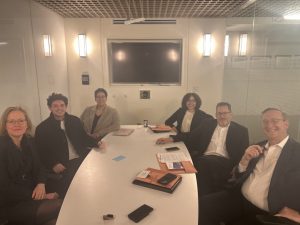Education
Education is at the core of the CSS mission to build a team of fellows, faculty and PhD students around advanced research on issues related to US foreign policy, military intervention, and the grand strategy as well as to become a hub within the Fletcher School, Tufts University, the broader Boston community to further a national dialogue. The Center focuses on excellence in training leaders in international and national security, strategy, foreign policy and diplomacy.
Click below to learn more about CSS’s Post-Doctoral Fellows Program, the Capstone Incubator, and the Afghanistan Assumptions Project.
Center for Strategic Studies
Post-Doctoral Fellows Program
The Center for Strategic Studies (CSS) at Tufts University’s Fletcher School of Law and Diplomacy invites applications for its postdoctoral fellowship program for the 2020-2021 academic year. Established in 2017, CSS is dedicated to producing policy-relevant research on strategy, international politics, and US foreign policy. CSS serves as a hub for students, faculty, scholars and practitioners to engage with one another in a supportive, collaborative, and collegial environment. Its mission is to educate future scholars and practitioners and generate cutting-edge scholarly analysis that broadens the U.S. foreign policy debate, exploring alternative strategies that: (1) enhances US security, sovereignty, prosperity, and territory; (2) respects the realities and complexities of international conflict; including human territoriality, legitimacy, and the ethnic, cultural, and religious differences of peoples; and (3) questions the utility of military intervention given its potential perils and long-term unintended consequences; including but not limited to, the loss of life, civil liberties, and resources. CSS works closely with the Security Studies Program.
CSS is interdisciplinary; it therefore welcomes applications from anthropology, economics, history, law, political science, natural sciences, and other related disciplines. This is a residential fellowship—fellows are expected to be on campus for the entirety of the fellowship period, which is September 1, 2020–August 31, 2021. Applicants should be no more than 5 years from the awarding of their degree. While Fellows will spend most of their time on their own research, they are also expected to participate in the Center’s programming, including presenting in research seminars, writing for the blog, attending conferences, workshops, and center activities. By the end of their term fellows are expected to complete a significant piece of research for publication and a shorter policy-relevant paper that will be published as part of the CSS’s White Paper series.
Fellows will be provided with a $50,054 stipend, medical benefits, office space, and a computer. As members of the Tufts Fletcher community they will have access to library system and other facilities of the University. Although only a few full fellowships are available, CSS encourages applicants to apply for other sources of funding as CSS might be able to provide partial and non-stipendiary appointments. Applicants should therefore indicate their needed level of support. Tufts University is an Affirmative Action/Equal Opportunity employer. We are committed to increasing the diversity of our community. Members of under-represented groups are strongly encouraged to apply.
Application due dates for 2020 are forthcoming.
Application materials include: a cover letter, research proposal (no more than five pages), C.V., one writing sample (no more than 10,000 words); the names of three recommenders (who could be contacted for letters). These materials should be submitted to css-postdoc@tufts.edu
The CSS Capstone Incubator Research Mentorship
The Center for Strategic Studies is delighted to announce the Capstone Incubator Project.
The purpose of the CSS Capstone Incubator is to facilitate the development of innovative research on strategy, international politics, and US foreign policy by the Fletcher School students.
The CSS Capstone Incubator offers hands-on mentorship for a limited number of Fletcher students studying in one- and two-year programs whose research interests lie in the area of:
- U.S. foreign policy and strategy;
- Realities and complexities of international conflict, including human territoriality, legitimacy, and the ethnic, cultural, and religious differences of peoples; and
- The utility of military intervention given its potential perils and long-term unintended consequences.
Research mentorship will be offered based on the alliance of the proposed capstone project with the CSS research area and quality of the proposal (focus, logical consistency, demonstration of initial familiarity and strong interest to the topic).
We invite Fletcher students apply for a CSS Research Mentorship, which will include:
- Being assigned a CSS faculty member as a capstone advisor;
- Close work with the assigned member of the CSS team on developing the capstone research question, outline, research strategy, and interim deadlines to assure the completion of the capstone by the last week of April 2018;
- Submission of the chapters of the capstone research for review and feedback;
- Publication of CSS blog-posts on the relevance of the chosen capstone topic and research findings; and
- An opportunity to compete to have the completed projects published by CSS as white papers.
The Afghanistan Assumptions Project (AAP) is a unique, independent, scholarly, research-based project into the 20-year engagement in Afghanistan.
The basis of the examination is 7 fundamental assumptions—political, military, economic, cultural, and diplomatic—that drove U.S. policy in Afghanistan. It will look beyond what the United States got wrong in Afghanistan to understand how it got it wrong.
This project is engaging a broad range of experts, both in convening a steering committee of policy experts, involved in key diplomatic, political, and military aspects of the war, and also in conducting individual interviews with other policymakers, scholars, journalists, and civil and military leaders.
The Center for Strategic Studies research will culminate in a series of white papers, journal publications, and a serialized set of articles for academic and policy communities examining which lessons learned from past mistakes can be applied to future strategic decision making by policymakers. In particular, the CSS team will investigate critical inflection points in the war in Afghanistan when policy shifted most dramatically, and address key assumptions made by United States policymakers and foreign policy analysts.

